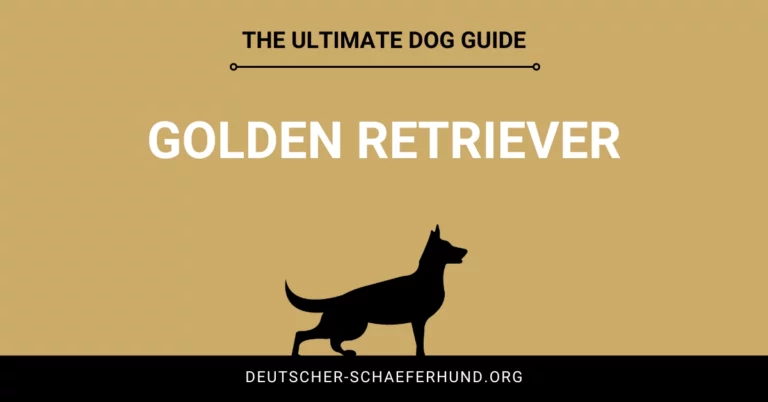Introduction
Golden Retrievers, first bred in Scotland during the 19th century, was initially developed as a breed that would be adept at retrieving games from both land and water. The breed’s intelligence, friendly demeanor, and physical attributes have made them popular pets and service animals worldwide.
| Characteristic | Detail |
|---|---|
| Breed Origin | Scotland |
| Average Lifespan | 10-12 years |
| Average Weight | 55-75 pounds (female), 65-75 pounds (male) |
| Temperament | Intelligent, Friendly, Reliable |
| Exercise Requirements | Hoch |
| Pflege | Moderate to High |
| Diät | High-quality commercial dog food tailored to their age, size, and activity level |
| Common Health Issues | Hip dysplasia, Certain types of cancers, Eye disorders |
Understanding the Golden Retriever Breed
Physical Characteristics
Golden Retrievers are medium-large dogs with a dense, water-repellent coat that is typically a rich, luscious golden color. Their eyes are typically brown and expressive, reflecting their intelligence and friendly nature.
Temperament
Golden Retrievers are known for their friendly and patient demeanor. They are great with children and compatible with other animals, making them excellent family pets.
Owning a Golden Retriever
Ideal Home Environment
Golden Retrievers need enough space to play and run around, but with enough exercise, they can adapt to different living situations, including apartments.
Exercise Requirements
Golden Retrievers are an active and fun-loving breed; they require lots of exercise to stay healthy and happy.
Training Requirements
Training is usually straightforward with a Golden Retriever as they are very eager to please their human companions and are exceptionally trainable.
Health and Nutrition of a Golden Retriever
Typical Diet
Golden Retrievers do well on a balanced diet of high-quality dog food, suited to their life stage, size, and activity level.
Common Health Issues and Prevention
Some of the breed-specific health problems Golden Retrievers can face include hip dysplasia, certain types of cancer, and eye disorders. Regular check-ups with the vet can help prevent or manage these issues.
Grooming and Maintenance for Golden Retrievers
Coat Care
Golden Retrievers require regular brushing to keep their coats healthy and to manage shedding.
Bathing and Cleaning
Bathing your Golden Retriever regularly will keep them clean and help maintain a healthy coat and skin.
Aging and End-of-Life Care for Golden Retrievers
Changes to Expect as Your Golden Retriever Ages
As Golden Retrievers age, they may experience a decrease in activity levels, and potential weight gain, and may develop age-related diseases.
Managing Common Health Issues in Senior Golden Retrievers
Common health issues in older Golden Retrievers include arthritis and hip dysplasia. These conditions can often be managed with medication and lifestyle adaptations.
Joining the Golden Retriever Community
Local and Online Groups for Golden Retriever Owners
Joining a local or online group can provide support, advice, and camaraderie for Golden Retriever owners.
Participating in Breed-Specific Events
Golden Retrievers are popular in various dog sports, including obedience and agility trials.
Training a Golden Retriever
Starting with Basic Commands
Training a Golden Retriever should start with basic commands like ‘sit’, ‘stay’, ‘come’, and ‘heel’. These commands lay a foundation for a well-behaved dog and strengthen your bond with your pet.
Introducing Advanced Training
Once your Golden Retriever masters basic commands, you can move to more advanced training, such as tricks or specific tasks. Their high intelligence and eagerness to please make them excellent candidates for advanced obedience training and agility courses.
Playtime and Activities for Golden Retrievers
Importance of Playtime
Golden Retrievers are active and fun-loving animals. Ensuring they have adequate playtime each day is essential for their physical health and mental stimulation.
Recommended Activities
Retrievers love games that involve fetching, like frisbee or ball games. They also enjoy mental stimulation games such as puzzle toys or hide and seek.
Golden Retrievers as Working Dogs
Roles in Service and Therapy
Golden Retrievers often work as service dogs, providing assistance to those with disabilities, or as therapy dogs, offering emotional support in hospitals, schools, and nursing homes.
Roles in Search and Rescue
Their acute sense of smell and eagerness to work make Golden Retrievers excellent search and rescue dogs, often deployed in disaster areas to find survivors.
Traveling with Golden Retrievers
Preparing for Travel
If you plan to travel with your Golden Retriever, prepare them by acclimating them to car rides or crates (for air travel). Also, remember to pack their essentials, including food, water, and their favorite toys.
Choosing Pet-Friendly Destinations
When planning vacations, consider pet-friendly destinations. Many places cater to dog owners, offering amenities like dog parks, pet-friendly accommodations, and outdoor dining areas that welcome dogs.
Choosing the Right Golden Retriever Puppy
Recognizing Healthy Puppies
A healthy Golden Retriever puppy should be lively and curious, with clean eyes, ears, and skin. They should be up-to-date with vaccinations and deworming treatments.
Working with Reputable Breeders
When choosing a puppy, it’s crucial to work with reputable breeders who prioritize the health and temperament of their dogs over physical appearance or profit.
Safety Considerations for Golden Retrievers
Creating a Safe Home Environment
Just like child-proofing a house, creating a safe environment for your Golden Retriever is crucial. This involves securing loose wires, keeping toxic substances out of reach, and ensuring there are no small objects that your pet could swallow.
Golden Retrievers in Popular Culture
Famous Golden Retrievers
Golden Retrievers have been featured in numerous films, TV shows, and books, making them one of the most recognizable breeds. Famous examples include Comet from the TV show “Full House” and Shadow from the film “Homeward Bound”.
Understanding the Breed’s Lifespan
Expected Lifespan
Golden Retrievers typically live between 10 to 12 years. While this is a relatively standard lifespan for a dog of their size, it’s essential to understand this commitment before bringing a Golden Retriever into your home.
Golden Retrievers and Water
Golden Retrievers’ Affinity for Water
True to their heritage as waterfowl retrievers, Golden Retrievers have a natural affinity for water. They enjoy swimming and can be great companions for water-related activities such as boating or beach visits.
Socialization of Golden Retrievers
Importance of Early Socialization
Proper socialization from a young age is vital for Golden Retrievers. Exposure to a variety of people, places, sounds, and experiences can help them grow into well-adjusted, confident adult dogs.
Dealing with Separation Anxiety in Golden Retrievers
Managing Separation Anxiety
Golden Retrievers form strong bonds with their human families and can sometimes experience separation anxiety when left alone. Providing plenty of physical exercise, mental stimulation, and training can help manage this issue.
Schlussfolgerung
We’ve delved deep into the world of this beloved breed, touching on every aspect from their charming physical characteristics, their friendly temperament, to their health needs. It’s undeniable that bringing a dog into your home, especially one as sociable and loving as a Golden Retriever enriches our lives in many ways. From their loyal companionship to their boundless enthusiasm for life, they indeed add a golden touch to our everyday existence.



